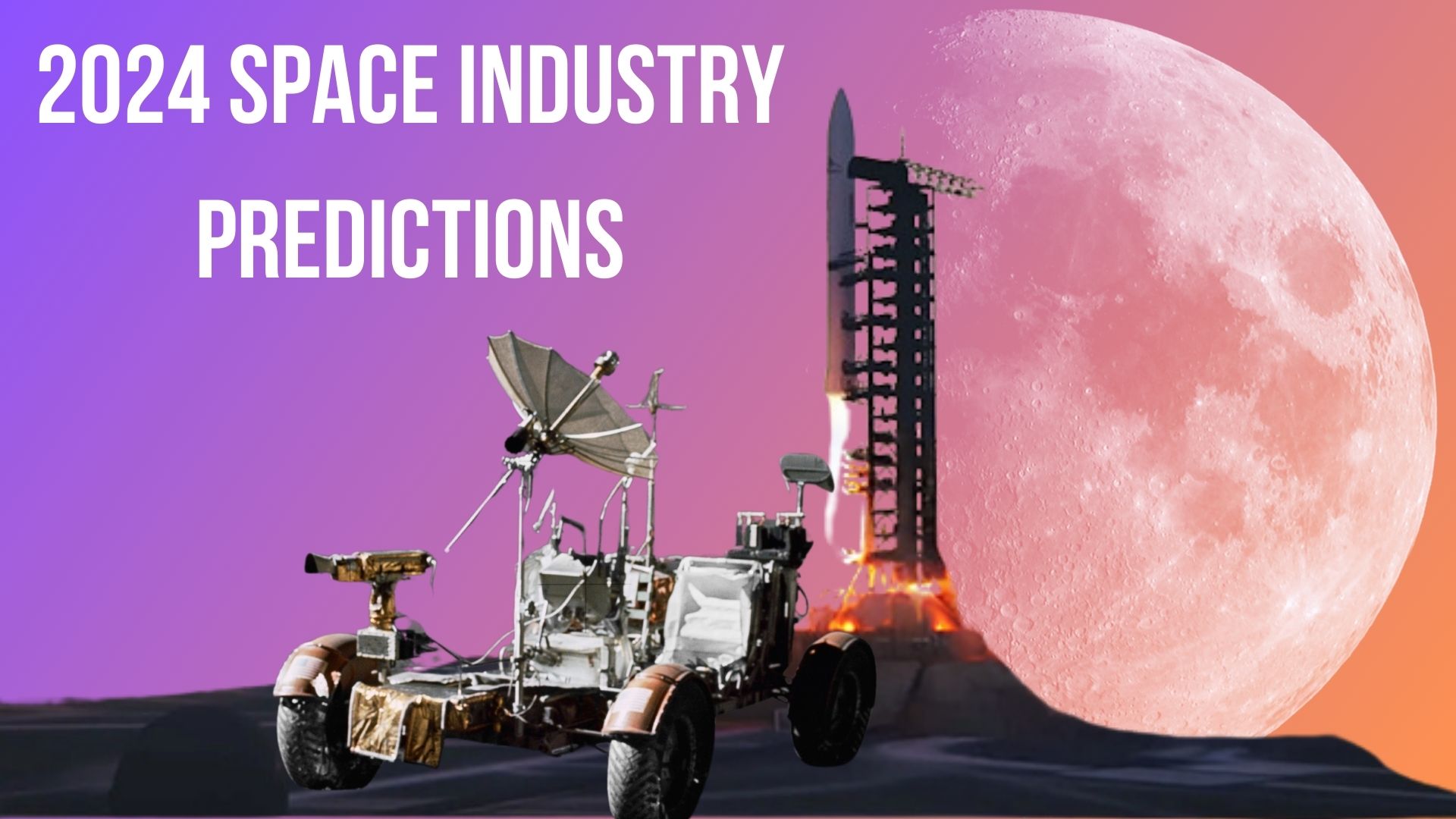OT Looks Forward: Our 2024 Space Industry Predictions
2nd Feb 2024
Our 2023 Year in Review article was well received – thanks to you, readers, for spending your time reading it! In the article, we focused on people in the space industry and with them, why a passion for space matters. We’ll continue this focus for our 2024 space industry predictions (with all due apologies to our future computer masters). As before, people will determine what happens at the make-or-break points of this year.
TANSTAAFL 2024
The Moon has been in focus already in 2024, and this will continue throughout the year. If ‘space is hard’ is a mantra, then I’d suggest ‘There Ain’t No Such Thing As A Free Lunch’, or TANSTAAFL, with a nod to The Moon is a Harsh Mistress by Robert Heinlein, for the difficulty in lunar operations. Astrobotic’s Peregrine returned to Earth for a re-entry disposal after mechanical failure, and JAXA’s SLIM is in a precarious state on the lunar surface at the time of writing. We’ll be feeling the knock-on effects, especially regarding Peregrine, as NASA’s Artemis programme postpones missions in response. However, as Goonhilly Earth Station CEO Ian Jones pointed out in an interview with Orbital Today, there’s a community of people focused on lunar operations coming, and ” I think it’s in that environment where you suddenly get the leaps and bounds because when you care very deeply about something, you learn very quickly from the mistakes.”
Increasing visibility for women
Orbital Today wholeheartedly derides anyone who asserts that discussions of sexism in the space industry are not required. Moreover, we’ll be talking with some of the women among the UK’s companies who are changing that with their presence and clearing the air.
Don’t take my word for it. Here’s the word from Melissa Quinn, General Manager of Seradata.
Although I am increasingly not the only woman on space panels and at space meetings, which is great, there is still more that needs to be done. We need more women, and overall diversity, in active leadership roles. We also need to put more women from the industry in front of young people, boys and girls, to break down stereotypes. Finally, the UK Space Industry needs to transform traditional ways of working, like gender gap in salaries, maternity pay, whistleblowing processes, and even altering the way we run events & conferences to make women feel safe.
Melissa Quinn
Word of the Year: Astropolitics
Given the long lead times that the space industry usually requires (more on that below), it’s hard to surprise anyone with an industry event. So, when Iran launched a pair of rockets in January 2024, it shouldn’t have come as a shock; Iran is an emerging space power. It’s the response from European powers, condemning the launches as the implementation of dual-use technology, that should capture attention.
Concerns about lunar operations by competing countries, and possible claims to territory or material that those operators might make, will only rise throughout the year. Moreover, satellite and anti-satellite operations by competing or hostile nations are certain to increase as well.
Astropolitics will increase in importance. Commercialization in some space market segments will add confusion, and probably be taken advantage of by some state actors. Space Situational Awareness and Space Domain Awareness will connect here for both military and commercial applications, and we’ll be looking at both of those as well.
A New Escape Velocity
First, kudos to Firefly for a successful Victus Nox launch in September 2023, and the rapid and successful uptake of the mission. While long lead times have been the norm, geopolitical and astropolitical concerns require a quicker pace, and the state and commercial actors who can turn out an operational object in space more quickly will have an important upper hand. Firefly’s feat will be repeated by other companies by end-year, but will it be commonplace? Good question. We’ll ask Firefly in 2024 for sure.
A New British Invasion
Perhaps a misnomer here, but the arrival of British companies into the American space sector is something that we’ll be paying attention to at Orbital Today. These are not just widget manufacturers. Goonhilly Earth Station’s 2023 purchase of COMSAT lays the ground for a commercial venture offering global radio connection with satellites, explorers and landers going around Earth, onto the Moon and even Mars and beyond.
Space Forge and the British Embassy in Washington hosted a get-together showcasing British space companies in America. We’ve interviewed Josh Western in 2023 about ForgeStar1A. We’ll be returning to Space Forge about that connection, and actively looking at other UK companies looking westward.
Launch, finally
‘Start Me Up’, or ‘Bring It Home’, or a long list of catchy names for ventures that ultimately failed; let’s drop them. Somewhere in Scotland, probably SaxaVord, a vertical launch will take place in 2024. The question of just who the launch partner is – Rocket Factory Augsburg?, Skyrora?, Lockheed Martin? – that’s an open one. We’re not as hopeful for Sunderland, though they might surprise, given the late-December funding injection from the UK government and multiple leadership changes.
Horizontal launch? Not this year. We’re hoping to see more progress reports from Astraius, but a launch doesn’t seem to be in the cars. Spaceport Cornwall state that they’re in talks with new launch partners, but it’ll be quiet there, launch-wise, until 2025.
Let’s end this 2024 space industry predictions with a note on just that from Skyrora CEO and Founder Volodymyr Levykin. I think it sums things up pretty well.
2024 will be a landmark year for the spacetech industry, especially in the UK. Not only is a launch from British soil inevitable, so is a General Election. Whichever party wins power next year will determine how much emphasis will be placed on the space sector – will we see more funding? Changes to R&D? A stronger pipeline of skilled tech and engineering talent? The space industry generates billions of pounds and employs hundreds of thousands, as such, it is a key sector to get right for the future of the British economy and if the UK truly wants to cement itself as a science and technology superpower.
Volodymyr Levykin






Thank you for your comment! It will be visible on the site after moderation.